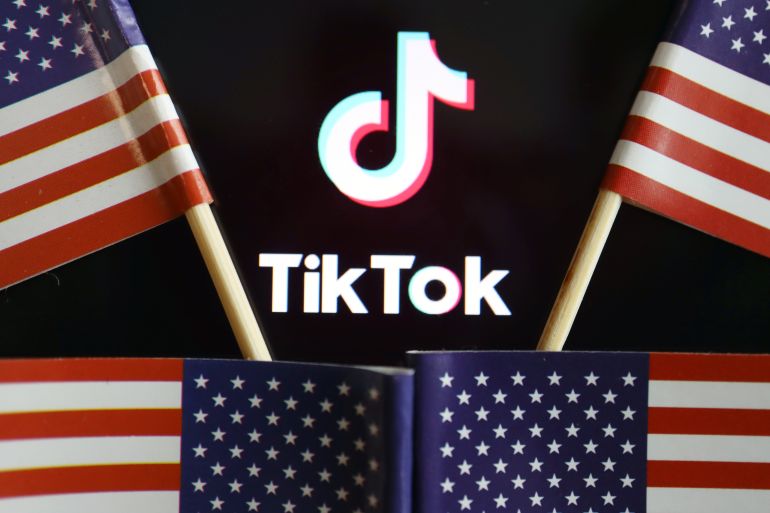US TikTok’s future in jeopardy as Biden signs ban bill: What’s next?
TikTok’s Chinese owner, ByteDance, has nearly a year to divest or face a ban as US lawmakers say the company poses a security threat.

The US Senate has overwhelmingly approved a bill that would ban TikTok unless its Chinese owner, ByteDance, divests from the video-sharing app in nine months amid concerns that the company poses a national security threat.
TikTok has denied the Chinese government could access users’ data and has dubbed the bill, which was passed by a 79-18 vote, as unconstitutional. The bill was attached to a measure to provide a $95bn emergency aid package for Ukraine, Israel and Taiwan.
Keep reading
list of 4 itemsTikTok asks US judge to block Montana ban
How will Gen Z react to the TikTok ban in the US?
Dissecting the ‘TikTok problem’
President Joe Biden has said he will sign it into law on Wednesday.
What do we know about the TikTok ban, and what happens next?
Why the ban on TikTok? How will it impact TikTok?
ByteDance bought the popular karaoke app Musical.ly and relaunched it as TikTok in 2017. It is one of the fastest-growing apps in the US, and has 150 million monthly subscribers. In 2023, the platform boasted more than one billion monthly active users globally and a revenue of $120bn, of which $16bn comes from the US.
The app’s growing influence has drawn the attention of spy agencies and US lawmakers who have expressed fear that TikTok might share users’ data with the Chinese Communist Party (CCP), a claim the company has denied. The data, some say, could also be used by China to spread misinformation that could harm the democratic process.
“For years, we’ve allowed the Chinese Communist Party to control one of the most popular apps in America. That was dangerously shortsighted,” said Senator Marco Rubio, the top Republican on the US Senate Select Committee on Intelligence. “A new law is going to require its Chinese owner to sell the app. This is a good move for America.”
In December 2022, the US Congress banned the use of the app on any federally issued device or network. Several other countries have followed suit, imposing curbs on the use of TikTok in government offices. India banned the app in 2020, when there were 200 million subscribers in the wake of border skirmishes.
The widely popular app has also been accused of pushing pro-Palestine content – a claim the company has denied. TikTok’s young users (ages 16-24) in the US, who form 60 percent of its total users, sympathise with Palestine, the company said last November.
TikTok’s executives have been grilled during multiple congressional hearings. In March of last year, the company’s Chief Executive Shou Zi Chew assured lawmakers that TikTok had taken steps to safeguard user data.
The company has also invested $1.5bn to store TikTok in the US, and Oracle, a US-based multinational corporation, would provide the cloud and storage services for the project. It has also taken measures to separate its US operations from its Chinese parent company.
China’s Foreign Ministry has said that the US allegations were not backed by evidence and the ban would undermine fair competition. Several Chinese tech firms have been blacklisted by the US amid a war over the internet and technology between Washington and Beijing.
Last week, Apple said Beijing had ordered it to remove Meta Platforms’ WhatsApp and Threads from its App Store in China over Chinese national security concerns.
Will TikTok cease to exist with immediate effect?
If ByteDance refuses to divest the company, the app would lose access to app stores, web hosting and network providers.
Until the nine-month deadline, TikTok will remain active in the US. The US president can grant an extension of the deadline for 90 more days if the company is seen as progressing on the terms set in the law.
What can TikTok do now?
While TikTok is able to operate in the US, for now, the company executives and attorneys will have to fight on legal grounds.
“This unconstitutional law is a TikTok ban, and we will challenge it in court. We believe the facts and the law are clearly on our side, and we will ultimately prevail. The fact is, we have invested billions of dollars to keep US data safe and our platform free from outside influence and manipulation,” TikTok said in a statement on Wednesday.
TikTok is set to challenge the bill on First Amendment grounds and TikTok users are also expected to again take legal action. A US judge in Montana in November blocked a state ban on TikTok, citing free speech grounds. The US Constitution guarantees the right to free speech under the First Amendment.
The American Civil Liberties Union said banning or requiring divestiture of TikTok would “set an alarming global precedent for excessive government control over social media platforms … If the United States now bans a foreign-owned platform, that will invite copycat measures by other countries.”
Senator Ron Wyden, a Democrat, said he was concerned the bill “provides broad authority that could be abused by a future administration to violate Americans’ First Amendment rights”.
In 2020, former US President Donald Trump attempted to legislate his own TikTok ban, but he has somewhat done a reversal on banning the popular social media app while campaigning for another term in office. On Monday, Trump posted on his Truth Social platform: “Just so everyone knows, especially the young people, Crooked Joe Biden is responsible for banning TikTok.”